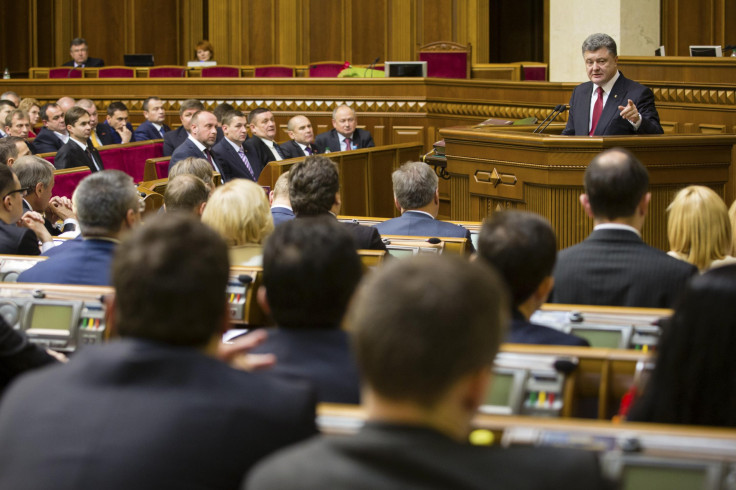Is Ukraine Joining NATO? Kiev Closer To Military Alliance After Abandoning 'Non-Aligned' Status

Ukraine is closer to joining NATO after the Eastern European nation’s parliament voted Tuesday to end the country’s neutral status toward military alliances. Russia called the move “an unfriendly step toward us.”
Russia, Ukraine’s neighbor to the east, pushed for Ukraine to seek “non-aligned” status in 2010, according to the BBC. Russia views the NATO alliance, which was originally formed to protect Eastern European countries from the Soviet Union, as a threat to its security, according to Reuters.
But tensions grew between Ukraine and Russia this year after Ukraine uncovered evidence that Moscow was aiding pro-Russia separatists in eastern Ukraine and Russia annexed the Ukrainian territory of Crimea in March. Protests gripped Ukraine in late 2013 after citizens demanded the ouster of then-President Viktor Yanukovych, who had close ties with Russia. Petro Poroshenko, the country’s current president, is aligned with the West, and NATO countries have backed Kiev in its dispute with Moscow.
While Tuesday’s vote opens up the door for Ukraine to join NATO, it will likely take years before Ukraine will be in the military alliance, according to Reuters. "Our door is open and Ukraine will become a member of NATO if it so requests and fulfills the standards and adheres to the necessary principles,” a NATO spokesman said.
The 303-8 vote in the Verkhovna Rada, the official name for Ukraine’s Parliament, angered Russia. “This is an unfriendly step towards us, particularly in the current situation,” Andrey Kelin, Russia’s ambassador to the Organization for the Security and Cooperation in Europe, told Russia’s TASS news agency. “This will only make our relations acuter, we will take this negatively.”
Sergei Lavrov, Russia’s foreign minister, said the vote was “counterproductive” in working toward peace between Russia and Ukraine. "It will only escalate the confrontation and creates the illusion that it is possible to resolve Ukraine's deep internal crisis by passing such laws," he said, according to Reuters.
© Copyright IBTimes 2025. All rights reserved.






















